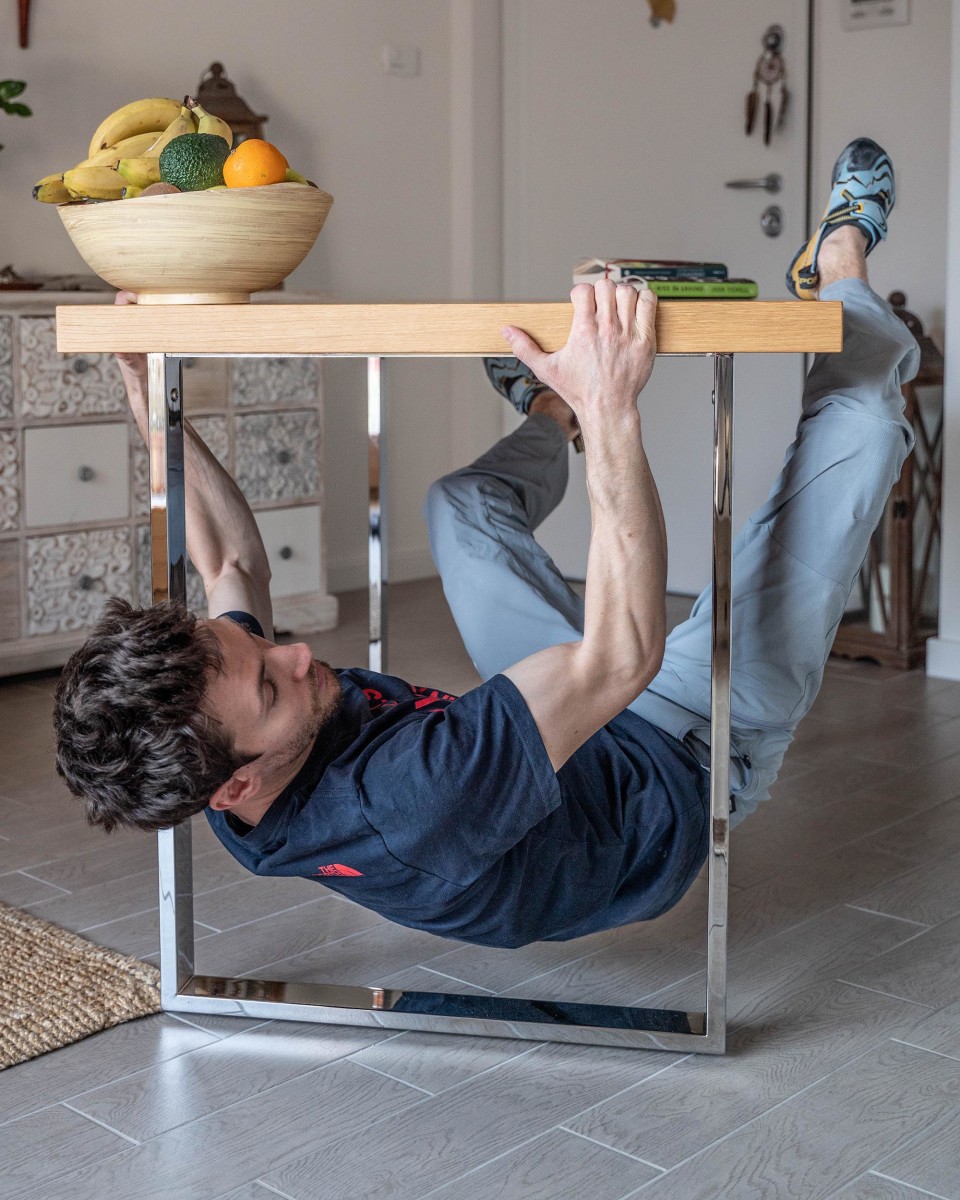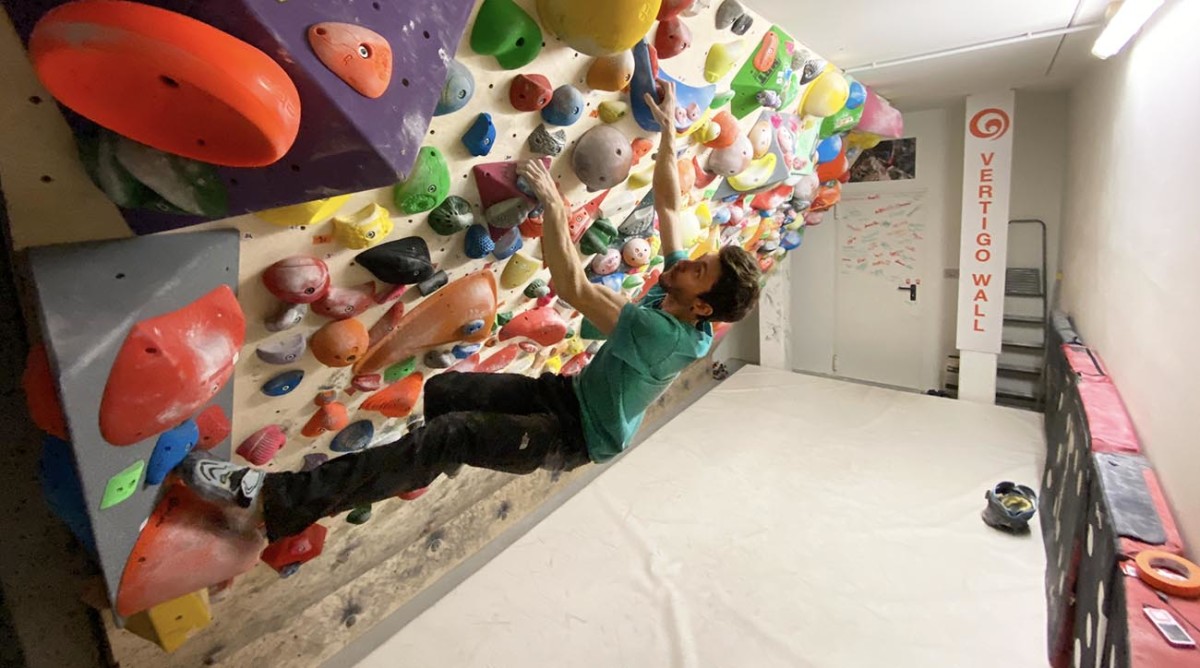Olympic Rock Climbers Are Getting Creative at Home on Lockdown
Stefano Ghisolfi occasionally climbs his kitchen table to pass the time. Brooke Raboutou traverses her house, starting from the back of her staircase and gliding from room to room by scaling the walls. Kyra Condie hangs from the board she installed above a door frame in her apartment.
This is the new normal for Olympic rock climbers on lockdown.
As the coronavirus continues to spread, Olympic athletes around the world are figuring out how to maintain some semblance of a workout regimen while not knowing when they can return to their regular intense routines. It will be longer than anyone originally anticipated—the International Olympic Committee officially announced its decision on Tuesday to postpone the Tokyo 2020 Olympics and Paralympics until next year.

Rock climbing—or sport climbing, as it will officially be called at the Games—is set to be one of four new sports to debut at the Tokyo Olympics. To train at the highest level, climbers need to be outside or go to gyms with equipment and climbing walls. With limited resources at home, climbers are devising innovative ways to stay fit for whenever the Games are rescheduled.
Ghisolfi is a senior member of the Italian climbing national team and a five-time World Cup champion. Before the coronavirus outbreak, he was in the midst of competing with three other climbers for the final spot on the Olympic squad. Only 20 men and 20 women will qualify, with each country having a maximum of four athletes on their team (two men and two women).
He lives in the quaint Italian village of Arco—about 200 miles east of Turin, 100 miles west of Venice, and 100 miles south of the Austrian border—in the northern part of the country where the pandemic is especially dire. While Ghisofli, 27, is thankful for his health and that of his girlfriend and their families, he also has to keep up his training, which he can do on the 16x10-foot climbing wall in his garage. He spends several hours a day on it, which not only keeps him in shape but takes his mind—albeit briefly—off the reason why he’s stuck at home.
Ghisolfi can go outside and sit on his balcony, but he can’t go for a run with the strict rules currently in place. So, for some version of cross-training, he’s turned to creating climbing challenges for his 131,000 Instagram followers. He recently started the “table training challenge” where the goal is to move in circles around your kitchen table or office desk without touching the ground. “I thought that if anyone was at home and the only thing they could hang on was a table, it could be fun,” Ghisolfi says. He’s done live-streaming and even made a 48-minute how-to video which starts with him showing people how to do pullups underneath their furniture. Every day he reposts a handful of clips of followers trying to mimic his movements.
“I thought this would be a way to bring people together,” Ghisolfi says. “There are lots of people who are losing their jobs and it’s a critical situation, so I tried to keep people smiling and see the positives and make them laugh. I hope.”

Ghisolfi’s videos have reached Salt Lake City, where Condie, one of four American climbers to have already qualified for the Tokyo Olympics, has been inspired. Abiding stay-at-home rules, Condie, 23, recently bought and installed a hang board, which looks like a thick bar with various climbing holds on it, over one of her door frames. She can do pull-ups, work on her finger and shoulder strength, make up canvassing routines, and work on her endurance simply by hanging on it for a few minutes at a time. With minimal equipment, she figures to make up some “off the wall stuff,” too, with a jump rope, a 30 lb. weighted vest and stretchy resistance bands. She’ll keep this up for however long she needs to with the Olympics postponed.
“I love training to get stronger,” she says. “Even if there’s no immediate goal to use it.”
Condie knows she could be stuck at home for weeks or months, which is fine for a homebody like her. But even elite athletes are human, and it can be tough to stay disciplined when you can easily sleep in or browse Netflix all day.
“To have to do this at home is a whole different battle because there are so many distractions,” Condie says. “It’s easy to be like, well, I’m going to watch TV. To get motivated at home has always been difficult for me. Even in school, I’d go to coffee shops to do homework.”
Raboutou, 18, is grateful to live with her parents in Boulder, Co., during such an uncertain time. It’s beneficial for training too, with both mom and dad being former World Cup climbing champions. They also have a small climbing wall in the basement that her dad built more than 10 years ago.
A big part of training, Raboutou says, is going to different gyms and getting experiences with different boulder formations. That’s important because at the Olympics, climbers will be asked to compete in a combined event which includes three disciplines: speed, boulder and lead climbing. Usually climbers specialize in one.
Eventually, Raboutou will go back to those gyms, life will get back to normal and the IOC will announce a new date for the Olympics. In the meantime, tables, chairs and homemade climbing walls will have to suffice.
“That’s the better and safer idea,” Ghisolfi says. “I can train safely without leaving my home, but most of the athletes cannot.”
